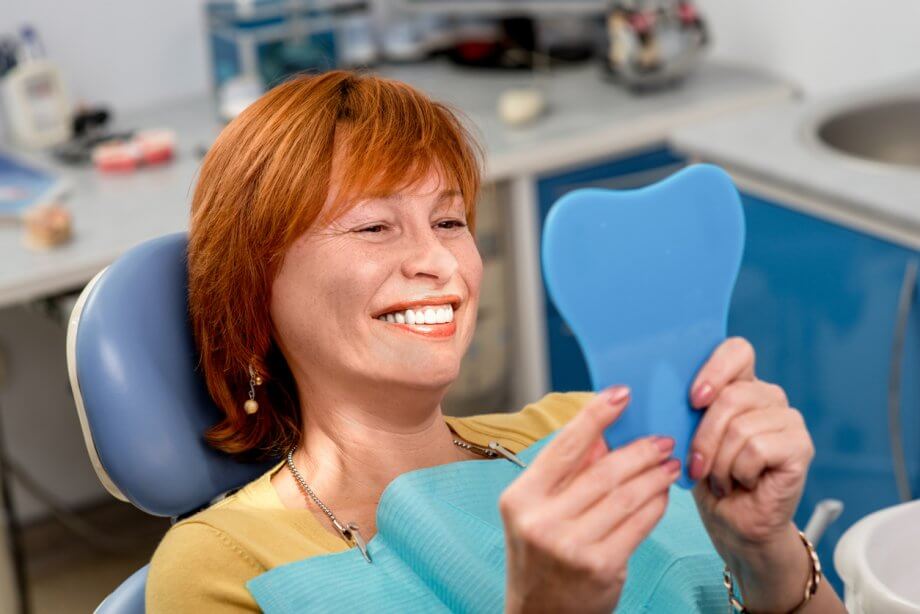When you are missing a tooth, you have three options: you can get a dental implant, a dental bridge, or just leave it be. We don't recommend the third option--doing nothing is certainly an option that works for every budget, but when a tooth isn't replaced, it can alter the shape of your face, impact your speech patterns, cause problems with biting and chewing, and allow your remaining teeth to shift and become misaligned.
Now that we've narrowed things down to dental implants vs. bridges, let's go over what exactly these options are and the pros and cons of each.
What Are Dental Implants?
Dental implants are the preferred treatment for missing teeth. Unlike a dental bridge, dental implants replace both the root and crown of a tooth, which makes implants much more stable. While most of our patients are aware of single tooth dental implants, with a titanium root and porcelain crown, you can also have implant-supported dentures and a full arch with only four implants.
When three or more teeth in a row are missing, an interesting hybrid option is the implant supported bridge. With this device, the two outermost missing teeth each receive a dental implant and these implants act as supports for the bridge in the middle that replaces the remaining missing teeth. The implant supported bridge offers more stability than a traditional bridge, but is a more affordable option than replacing all of the missing teeth with their own implant.
The Pros and Cons of Dental Implants
The Pros of Dental Implants:
- With their strength and durability dental implants perform most like natural teeth.
- Because they replace the root of the tooth, implants can reverse jawbone loss and ensure that your bite is strong.
- Implants are the best option to restore your natural smile.
- With proper maintenance, dental implants can last a lifetime.
- When there is significant decay or weakness in the teeth surrounding a missing tooth, implants are the best option.
The Cons of Dental Implants:
- The procedure is more involved than getting a bridge--you can expect to spend more time at our office.
- If you've already experienced jawbone loss, you may need bone grafting prior to implant placement.
- Dental implants are more expensive than bridges.
- Dental implants are not always covered by insurance.
What Are Dental Bridges?
Dental bridges comprise of two abutments, or supports, on surrounding teeth, with a pontic, or false tooth, joining the two together. In a Traditional Bridge, the abutments are usually dental crowns placed onto two teeth adjacent to the missing one, but a more affordable option is the Maryland Bridge, which cements a metal or porcelain framework onto the abutment teeth to hold the crown in place. A Cantilever Bridge is used when the third molar is missing and there is only one adjacent tooth to serve as the abutment.
Another option is the implant supported bridge, which we discussed above.
The Pros and Cons of Dental Bridges
The Pros of Dental Implants:
- Dental bridges are usually at least partially covered by dental insurance, if not fully.
- Bridges are more affordable than dental implants.
- The process of getting bridges is easier and requires less time off of work.
- Dental bridges are an option when there is bone loss or other complications.
The Cons of Dental Bridges:
- Dental bridges typically last only 5 to 15 years, even with good maintenance.
- Bridges are not as strong as dental implants, which can make for a weaker bite.
- Bridges require work on surrounding teeth, while dental implants do not.
- Because bridges do not replace the root of the missing tooth, bone loss may continue unabated.
Dental Implants vs. Bridge: Which Is Right for You?
Reading through this article about the pros and cons of dental bridges and implants may have given you some idea about which option is best for your situation. The only true way to know whether you're better off with dental implants or bridges is to make an appointment with a qualified dentist, like one from our team at Smiles on the Upper Westside.
We'd love to meet with you to discuss options for replacing your missing teeth. Contact our NYC dental practice at 212-222-5225.

